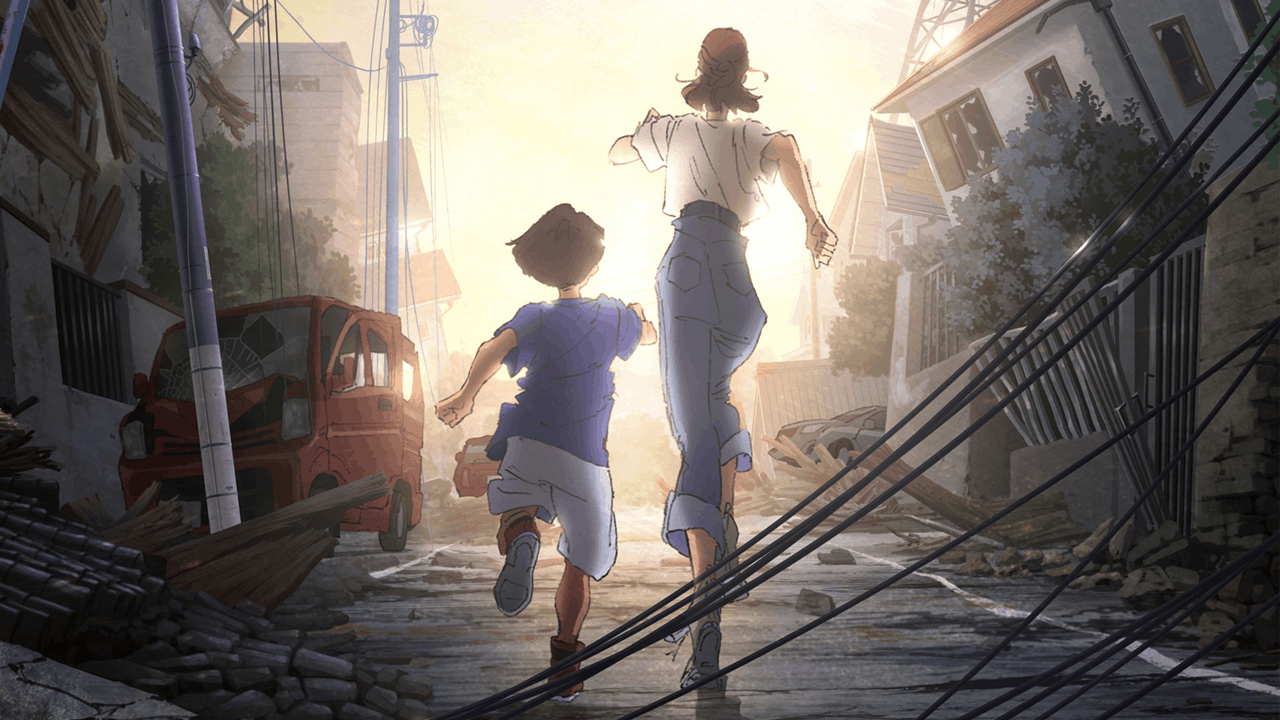English Dub Season Review: Japan Sinks: 2020 Season One
Overview (Spoilers Below):
The Mutoh family are separated when it happens. Without warning, a series of earthquakes strikes Japan. It’s not long before both the island along with everything else is descending into utter chaos. Ayumu and her brother Go join up with their parents, Kouichirou and Mari thanks to her dad’s dorky lights the neighbors always complain about. They may have survived, but they are among the exception, not the rule. And exceptions don’t happen often.
As the group tries to continue living in the brand new reality, they meet new friends and lose old ones. Ayumu helps defend her friend Nanami from an assault only to lose her to poison gas a few hours later. They have a run in with a strange commune and learn about a man who can predict when the quakes will occur. Ayumu eventually gets a chance to leave the doomed island because of her athletic potential, but turns it down in order to stay by her family’s side. By the end of the show, Ayumu and Go have lost both their parents, their homes, and their idealistic views of the world.
But much like the sun rising every morning, hope always returns. Two years later, a new island emerged where Japan once stood. Slowly, the people of Japan start to flock back, and roughly eight years after that deadly day, Go and Ayumu compete in the Olympics under the flag of the sun.
Our Take:
Japan Sinks 2020 is the second work to come out of Masaaki Yuasa’s contract with Netflix. The first series, Devilman Crybaby, was an epic tale of love amid grief and destruction. Japan Sinks is quite similar when it comes to the overarching themes and feelings it brings, although it exchanges the fanciful world of demons for one based in the harsh unforgiving nature of reality.
The series opens with a fully-loaded airplane, which has become a strange sight these days. The disaster takes place within the first few minutes of the premiere, and by the second episode, the mood has fully set in. The disaster genre has become well-known in recent times, and there’s a good reason. When so many things are falling apart around us, it’s only natural to want to see that reflected on screen, in order to show us that tragedy can be overcome with hope, determination, and a little luck. The excellent Tokyo Magnitude 8.0 is very similar to Japan Sinks: 2020, and it was released 11 years ago. The world has changed a lot since then, but audiences still enjoy seeing the more intimate angle on normal people working through life-threatening disasters.
In a world where so many barriers have been broken, it opens the door for many different topics to be touched upon. Throughout its ten episodes, Japan Sinks examines things like survivor’s guilt, fake news, and Japan’s attitude as a cultural toward outsiders and foreigners. Ayumu and Go are biracial. Their mother is from the Philippines while their father was born and raised in Japan. This colors many of the events in the series, from a group of survivors who abandon them because they aren’t ‘pure blooded’ to the ending, which sees the two of them living in a new kind of utopia that is welcoming to all.
Netflix’s dub is, on the whole, pretty average as dubs go. While everyone is well cast and performs their roles to the best of their abilities, there aren’t any standout performances or moments that made me glad I was watching the dub over the sub. And though there are always changes when translating the script into English, I noticed more little differences that bugged me with this series. Little scenes that play out slightly differently or sound a bit off in tone. Take when Ayumu is stuck in the lifeboat, for instance. In the original language with subtitles, she says, “I wonder what happened on that TV drama?” It’s clear that she’s reminiscing about a specific show, and that makes her feel real. Contrast that to the dub, in which the line is changed to “I wonder what happened on my favorite TV shows?” It feels so bland and generic, like a placeholder that never got touched up. And there are worse examples, like Mari’s final words.
Ayumu and her family’s journey through the ruins of Japan is in many ways hopeful. There are moments of light that shine through, like Mari’s steadfast optimism and Go’s childlike point of view. But there’s also a lot of darkness. The body count of the series is monumental, and at times the whiplash between hope and despair is difficult to watch. Especially in scenes like Nanami’s death, it felt less entertaining and more depressing. And while the ending for the series is certainly not dismal in tone, I can’t help but wish a little more light had survived the adventure.























"There are also other characters that come and go (also owned by the Warner Bros. Discovery conglomerate media company)."
Huh. Is that just referring to other characters from the show itself, or is this implying that the new season is going to have cameos from other WBD IPs